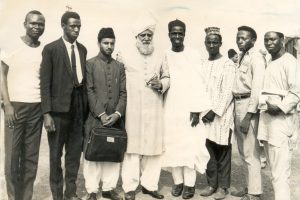
THE PROMISED MESSIAH(AS) AND IMAM MAHDI (GUIDED ONE), HAZRAT MIRZA GHULAM AHMAD(AS)
In actuality, the essential parts of the prayer are a symbolic representation of the form observed in spirituality. Man is required to stand in the presence of God Almighty and standing is also from among the etiquettes of servants. The bowing position, which is the second posture in prayer, demonstrates that one submits themselves by lowering their head in preparation to fulfil any command that may be given to them, as it were. Moreover, the prostration expresses, through action, the greatest possible reverence, utmost humility and lowliness, which are the objectives of prayer. These reverential practices and rites have been appointed by God Almighty to serve as a reminiscence of the deeper reality and so that the physical body may partake of the inner, spiritual essence. In addition to this, in order to reinforce in man the inner, spiritual rites, God has appointed outwardly, apparent rites. Now if in outwardly practice (which is a reflection of the manner observed at a deeper and spiritual level), one merely imitates certain apparent actions superficially and if one seeks to complete these actions only to rid themselves of a heavy burden, then do tell me, what pleasure and satisfaction can one gain from such practice? Until one is able to feel a pleasure and delight in prayer, how can its reality be perceived? This is only possible when the soul too falls in prostration at the threshold of God with a sense of complete self-effacement and humility; and when the soul too proclaims the words uttered by the tongue. It is then that a pleasure, light and comfort is attained.
It is my desire to write about this in further detail. A person undergoes various stages before they become a human being, i.e., starting as far back as sperm; in fact, even before this there are the constituent elements of the sperm, such as its nutrients, as well as their layout and construction. Then, after the sperm develops through various stages, it transforms into a child; children grow into adults, who finally reach old age. Hence, one ought to accept that it is the providence of Allah Almighty which nurtures human life through all of these diverse stages at various times and this entire state of affairs ought to remain firmly rooted in one’s mind. It is only then that a person can prove able to lay forth their own servitude in the presence of God’s providence. In short, the fundamental point to note is that pleasure and delight in prayer can only be derived when a relationship exists between man’s servitude and God’s providence. Until a person throws themselves before Allah Almighty, considering their own being to be nothing more than a complete non-entity or the like thereof – this being an inherent demand of divine providence – they cannot receive God’s grace and light. However, when they do receive this blessing, they experience an intense pleasure, which cannot be matched by any other. [1]
[1] Hazrat Mirza Ghulam Ahmad(as), Malfuzat – Volume 1 (Tilford, Surrey: Islam International Publications, 2018), 161-162.




Add Comment